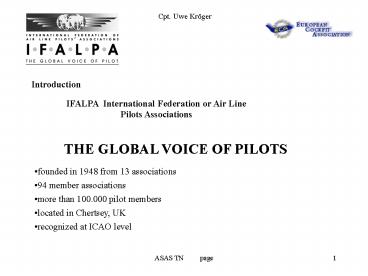ECA_pr PowerPoint PPT Presentation
1 / 18
Title: ECA_pr
1
Introduction
IFALPA International Federation or Air
LinePilots Associations
THE GLOBAL VOICE OF PILOTS
- founded in 1948 from 13 associations
- 94 member associations
- more than 100.000 pilot members
- located in Chertsey, UK
- recognized at ICAO level
2
The mission of IFALPA is to be the global voice
of airline pilots, promoting the highest level of
safety world wide and providing services, support
and representation to all of ist member
associations
3
11 Working Committees
- Accident Analysis Committee AAC
- Aircraft Design and Operation ADO
- Airport Ground and Environment AGE
- Air Traffic Services ATS
- Dangerous Goods DG
- Helicopters HEL
- Human Performance HUPER
- Industrial IND
- Legal LEG
- Security SEC
- Subscr./Constitution/Membersh./Ins. SCAMPI
4
ECA European Cockpit Association
founded in 1991 19 member associations 31.827
flight deck crew 18 nationalities (EU and
EEA) over 80 companies Chairman T. Iversen,
NorwayVice Chairman Carlos Salas, Spain
5
ECA - European Cockpit Association
Austrian Cockpit Association Sindicato Espanol
de Pilotos de Lineas Aereas Vereniging van
nederlandse Verkehrsvliegers Irish Air Line
Pilots Association Britisch Air Line
Pilots Association Association
Luxembourgoise de Pilotes de Ligne Luxemburg
Belgian Cockpit Association
Hellenic Air Line Pilots Association
Sindicato dos Pilotos da Aviacao Civil
Portugal Norsk Flyfeerbund
Norway Vereinigung Cockpit,
Germany Suomen
Liikkeennelenttäjälii, Finland
Syndicat national de Pilotos de Ligne,
France Associazione
Nazional Pilotos Aviazione Commerciale, Italy
Premiar Cockpit Union,
Denmark Vereinigung
des Cockpitpersonals der Swissair
Cimber Air Besaetningsforening,
Denmark Maersk
Air Pilots Association, Denmark
Flywebranchens Personal Union,
Denmark
Svensk Pilotförening
6
Introducing ECA
ECA is first and foremost concerned with aviation
safety The ECA ATM working group works in close
coordination with the IFALPA ATS committee
7
Ancient means of separation assurance
- the human eye
- Compass - fly heading
- Altimeter - maintain altitude
- Stopwatch -used for time based separation
- ADF Bearing - Track Separation
- VOR Radial - Track Separation
- and more modern
- FMS Navigation
- RNP Navigation
- RVSM
8
NO means of separation assurance
- TCAS last resort in case of loss of separation
- TIBA mainly used over AFI
- EGPWS loss of precise lateral navigation
9
Quote from IFALPA Annex 2, Attachment C
IFALPA Manuals refer to ICAO manuals
The basic purpose of air traffic rules and air
traffic control is to prevent collisions with the
least restriction on aircraft movements whilst
providing safe, orderly and efficient use of
navigable airspace. Adequate ATC systems should
provide the basic service of separation between
aircraft
10
Quote from IFALPA Annex 2, Attachment C
States should strive to establish an adequate ATC
system as defined by ICAO standards
and recommended practices. This ATC system is
ground based and controller centered. Where such
a system is not yet implemented, states should
endevour to create one. The near term investment
in ATC systems should be in efforts
to continously improve this ground based,
controller centered service. DRAFT POLICY 2001
11
Quote from IFALPA Annex 2, Attachment C
Air traffic separation based solely on cockpit
displays of traffic information may not
constitute a safe mode of operation. The pilot
community should not support the transfer of
separation responsibility to pilots in any but
the most regulated conditions.
12
Quote from IFALPA Annex 2, Attachment C
The possibility of pilot-induced mid-air
collisions under an airborne-based separation
scheme may represent an increased risk that has
not been recognised by the developers of airborne
separation procedures. For a multitude of human
factors and technical reasons, the federation
does not recognise the ability of flight crew to
perform airborne based separatin on a safe and
orderly basis. DRAFT POLICY 2001
13
Quote from IFALPA Annex 2, Attachment C
Therefore, the federation believes that
separation responsibility should remain with the
controller on the ground and does not support
the transfer of responsibility for separation to
flight crew outside the scope of current air
traffic rules DRAFT POLICY 2001 End quote from
IFALPA Annex 2, Attachment C
14
Question marks ???????????????????????????
- Certification ICAO, states, manufacturer
- Equipment level of redundancy, HMI, MEL
- Procedures separation minima applicable any
form of hierarchie - Areas of application interface topics, FIR/UIR
vs. Sector - Training flight crew, atc, dispatch
15
Question marks ???????????????????????????
- recurrent checking
- Mutual understanding between controllers and
pilots - government oversight control, sanctions
16
Conclusion
IFALPA ECA are prepared to contribute
valuable input to Eurocontrol ASAS activities
17
- The high level of safety achieved in airline
operations latelyshould not obscure the fact
that most of the accidents thatoccured could
have been prevented. This suggests that in many
instances the safety measures already in place
must have been inadequate, circumvented or
ignored. - Aviation itself is not inherently dangerous. But
to an evengreater degree than the sea, it is
terribly unforgiving of any carelessness,
incapacity or neglect - Insisting on perfect safety is for peolpe who
dont have the balls to live in the real world
18
Thank You for Your attention

